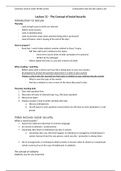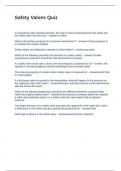Lecture 12 – The Concept of Social Security
Introduction to lecture
Thursday
- Look at legal sources which are relevant
- Define social security
- Look at administration
- Look at personal scope (main question being who is protected)
- Look at finance; who is paying at the end of the day?
How to prepare?
- Read text / watch video-related contents related to these 5 topics
- Pdf; files with text in relation to the topics
- Come from course (intro to basic principles of ss systems)
- Written by his colleague
- Videos explain the text; so, you don't need to do both
When reading / watching
- Reflect upon what is told to see how this is being done in your own country
- Be prepared to answer the question about how it is done in your country
- Prepare a short note (for yourself) on (hot) topic in relation to your national security system
- What is now the topic of the month
- And has a relation to one or more of the items discussed in class
Thursday meeting look
1. Start with question time
2. Discussion on basis of selected topic (e.g. Old exam question)
3. Discuss hot topics
4. Prepare session 2 (and 3) which will deal with risks
a. Discuss contingencies
b. He will launch a main question around which we will have to work (probably in 3 sub-
groups
Video lectures social security
What is social security?
➢ Away from national context but in common language
➢ An income to alleviate / avoid poverty
➢ Socializing risks which an individual may face in society
○ Socialising risks; any risks that happens to individual is managed by all individuals in
society instead of just the one person; social security / protection is always there
➢ Set of arrangements (/ techniques) which provide an income when its absent or compensate
certain costs (such as in the case of healthcare) in solidarity
The concept of solidarity
Solidarity may be very important
,Summary Lecture notes Mirthe Levels Comparative and Security Labour Law
➢ Take from wealthy give to poor
Or it may be restricted
➢ Pensions where only periods of illness or periods without income (because of e.g. pregnancy)
will be compensated for
❖ Solidarity is criterium
➢ System where you get out of it what you put into it without any element of solidarity
disqualifies as social security
➢ Third pillar arrangements; does it still fit with social security systems?
Presence of a social risk
➢ Identifying a number of social risks (covered by social security)
❖ Risks related to income compensation (loss/lack of income being compensated for)
○ Old age
○ Death
○ Unemployment
■ Lack of income
○ Reduced / in- capacity to work (and thus to earn income)
■ E.G. Because of handicap
■ Maternity
■ General
❖ Costs which will be compensated for / taken care of
aiming at providing necessary care / aid to people who need it
○ Childcare
○ Healthcare
○ Care
○ Need (‘poverty’, only that term is too narrow, need is e.g. Also related to absence of
education)
■ People do not have enough means of substance in accordance to human
dignity
What makes a right social?
➢ Losing your house by a fire is not included by this list
○ What makes a risk a social risk?
○ What makes certain eventualities social risks and thus are taken care for by social
securities and are other risks not taken care of?
○ E.G. Divorce vs your partner dying
❖ Because at a certain moment in time, a community decides for itself that you cannot leave a
certain risk to the individual; that you need to organise a system where you share a certain
type of risk with the rest of the community
➢ This means that the concept of social security is not established as something
permanent
Changing concept of a social risk
➢ Even the basis of what is defined as social risk can evolve
, Summary Lecture notes Mirthe Levels Comparative and Security Labour Law
○ E.G. Risk where more and more countries say they should stop considering it as a
social risk is survivorship
■ Will come back to later
■ Society where one person (man) earns income and wife takes care of
household and family → when husband dies, income goes away, which
creates problems that need to be solves
● However nowadays all people can participate in the labour market;
so, it’s a bit strange to give a ‘premium’ to those who did not follow
that path, so to those who stuck to the old path of one person
having a job and the other one not
○ In Estonia this is already removed from social risks part
○ In Netherlands it is also dissipating to consider this as a social
risk
○ Survivorship is still in many European countries but it is a risk
which is at battle and could disappear in the coming decades
○ ‘new’ social risk (or rather newly identified as social risk) e.g. Dependency
■ Meaning you cannot take care of yourself anymore because you’re too old /
handicapped / whatever reason; you don't manage to take care of yourself
■ In other times, there were other social mechanisms who took care of this,
e.g. Family; however, this is not the case anymore. Children don't live close
to their parents anymore; everyone has a job; thus, dependency as such is
being recognised as a new social risk (under a different name perhaps →
name has not been established yet)
Focus on benefits in cash
Ongoing competition between social security to take care of certain situations and other
mechanisms; what should be dealt with by family (and what is a family?). What is to be taken care of
by people themselves by insurances etc.?
If we define social security as “set of arrangements (/ techniques) which provide an income when its
absent or compensate certain costs (such as in the case of healthcare) in solidarity” → then we must
mainly talk about benefits in cash; also corresponds to traditional vision of social security = money
transfers
However, we will also include other types of benefits than just monetary when talking about health
care → some countries provide this in the form of compensating health care costs, while in other
countries healthcare provides you with services itself; so, services will be included with healthcare
Same goes for long term care dependency (to a certain extent)
Won't talk about the whole set of services of child care as that is something we will keep out of our
discussions because it would exceed the picture of social security too much; just a practical way of
dealing with it in order to talk about social security in the most common (international) terms.
Compulsory character
Do social security mechanisms need to be compulsory?
> yes → if it’s not compulsory it is in opposition with the concept of solidarity; so, all people need to
be involved in some way
There are social security arrangements which aren’t compulsory and still social security; however,
they are marginal




